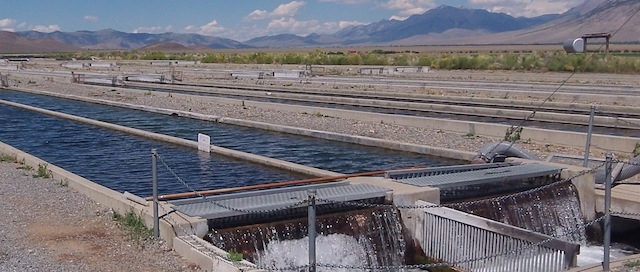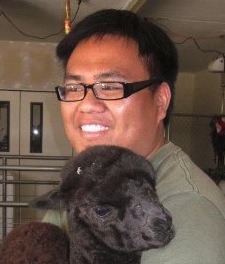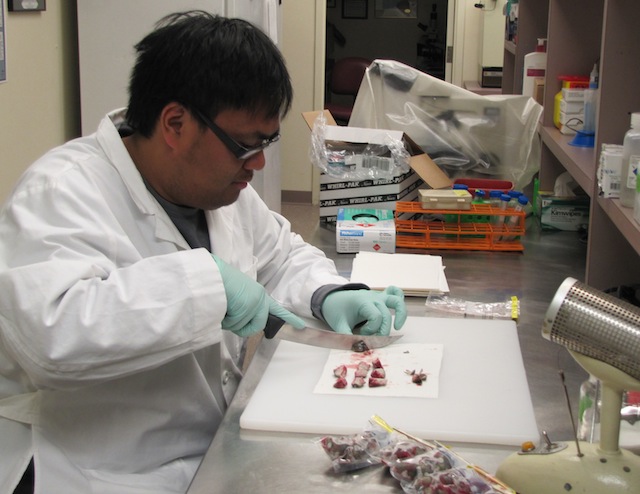Fish Medicine Internship: Future Aquaculture Veterinarian

 Spawning season had just begun when I arrived in Idaho. I found myself almost immediately on the road with a fish pathologist, traveling from hatchery to hatchery to collect tissues as part of a survey determining the prevalence of Whirling Disease in Steelhead salmon.
Spawning season had just begun when I arrived in Idaho. I found myself almost immediately on the road with a fish pathologist, traveling from hatchery to hatchery to collect tissues as part of a survey determining the prevalence of Whirling Disease in Steelhead salmon.
It was an eye-opening experience. Together we put on our waders and stepped into the cold raceways, wrestling strong Steelhead salmon and trying not to get too wet. The water was so cold that my teeth kept chattering every time I yelled out the measurements to the hatchery staff. Although I periodically lost the feeling in my hands, I was able to thaw them occasionally inside a bucket of warm water.

What Was I Doing in Idaho?
I found this fish health internship through a conversation with a 4th year veterinary student at Davis who also has an interest in fish medicine. After talking with him about my interest in fish medicine and aquaculture, he encouraged me to contact several fish diagnostic laboratories about internship opportunities over spring break. Spring break was only a week away, so I didn’t have much time to try to set something up.
As with most endeavors, I was not successful on the first few cold calls. I waited a few days then called each one back and again got the same reply from everyone – NO!
For once, I felt defeated. By the time I got to the last laboratory on the list, I was about ready to give up and was beginning to this unique pursuit of fish medicine.
When I picked up the phone to call Eagle Fish Health Lab, the Idaho Department of Fish & Game veterinarian, Dr. Phil Mamer, told me to call back once I was a veterinary student. I don’t know what came over me, but I cleared my throat and said,
[quote]No, I’m here right now, I’m really interested in fish medicine and willing to travel from California to Idaho for this once-in-a-lifetime opportunity. Whether you can offer me a position or not, I hope you’ll let me know right now. [/quote]
Dr. Mamer said he was happy to hear that I had a real passion for the field and respected that I wasn’t willing to take no for an answer. He accepted me for an internship in his lab right then and there.

Daily Activities During the Internship
I traveled over 2,000 miles through some very beautiful sites in Idaho, ranging from arid deserts to snowy mountains. It was a great time to gain not only hands-on experience in fish health, but also to see some incredible native wildlife including bald eagles, big-horn sheep, and pronghorn antelope.
At the first hatchery we spawned a total of eighty Steelhead salmon. In addition, we took fin clips for DNA analysis, obtained head wedges for parasite surveillance, and dissected kidney samples for viral surveillance. This part of my internship helped me hone my sterile techniques in obtaining tissues and working in a fast-paced environment.
When I was not on the road, I spent time in the diagnostic laboratory practicing my lab skills. I processed spleen, kidney, and head wedge samples obtained from the hatchery visits. It was great to be supervised by the experienced staff members, who were always willing to share their expertise in fish diagnostics.
The internship also provided my first exposure to a genetics laboratory that solely dealt with salmonid species. This provided a unique opportunity to learn how to extract fin clips from various hatcheries for DNA analysis.
Internship Logistics
The onsite dormitory was a really nice. You have your own private bathroom and a kitchen you share with other temporary hatchery workers. During my internship, I was on the road with the fish pathologists for three or four days of the week doing surveillance work for the various diseases they study during the chinook spawning season.
While my internship at the Eagle Fish Health Diagnostic Laboratory may have been short, it was one of the most rewarding internships I’ve ever had. Riding along with a fish pathologist and working with the laboratory staff taught me not only about fish medicine and hatchery care but also demonstrated the hard work that a few passionate individuals go through to ensure the survival of salmon in Idaho.
Elliott here again: Thanks again to Mark for sharing about this unique experience! Aquaculture is growing by leaps and bounds every year, and last year farmed fish production exceeded beef production for the first time in history. For a veterinarian who is interested in world travel and a good industrial-sized income, this could be a field to watch.
You’ll probably remember that Mark last wrote about his reptile medicine internship with the Turtle Conservancy. He’s provided a great example for other pre-vet students who are wondering if they can get their foot in the door with experiences typically restricted to veterinary students. It’s all about persistence.
Mark is also joining me for a virtual internship here at The Uncommon Veterinarian this summer. He’s been working hard to put together a Frequently Asked Questions page that should provide a lot of helpful information. He is also going to help me get the podcast back up and running — finally!
Are any of you interested in aquaculture and fish medicine? Can you recommend any other internships that provide similar experience?

Comments
Great job, Mark, on being persistent! I’ve also had great unique experiences as a pre-vet student, and it came down to “putting myself out there” and cold-asking strangers. My biggest piece of advice for fellow students looking for volunteer experiences is simply to get up the nerve to ask. No risk, no reward.
Good day!
I am Emmanuel Aries Castillo, a graduate of Doctor of Veterinary Medicine from the Philippines, and a recently licensed veterinarian (PRC licensed). I am seeking for a job related to fish medicine because I want to engaged in fish health medicine. I hope someone could help me where to apply..Thanks!